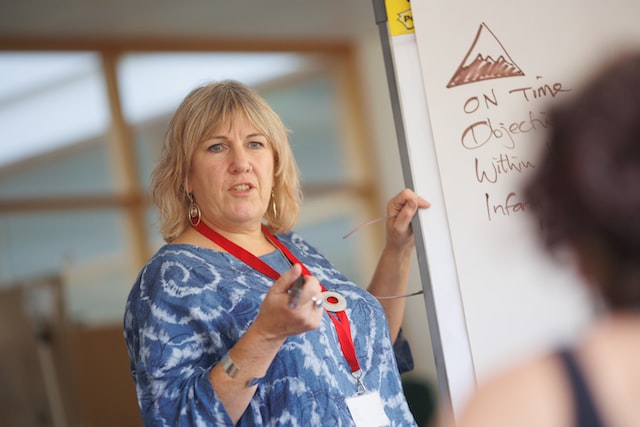
The Spending Plan
2023-2025
Creative Pathways to Higher-Paid Careers
- Offer training programs for Direct Service Workers (DSW) that will lead to higher-paid careers.
- Increase retention and attract new and younger generations of Direct Service Workers (DSW).
Mission
We seek to empower people with developmental and intellectual disabilities so they can live lives full of choice and possibility while actively seeking out opportunities to achieve their full potential as individuals.
Smoothing Care Transitions
- Train and deploy Certified Nurse Assistants (CNAs) as “transitions specialists”.
- Promote independence and education on the benefits of finding alternative community support options.
Leveraging Technology and Person-Centered Care
- Adopt enabling technology to help people with Intellectual and Developmental Disabilities (IDD) gain independence.
- Encourage promotion within the agency to save costs and improve on employee benefits.
Vision
We believe all people are worthwhile. Bidets Care work together with people who experience unique challenges and abilities along with families, friends, and organizations to help people maximize their abilities to meet goals and dreams and fully participate in the community of which they are vital members.
Expand Bidets Care’s Impact
- Create business growth and expansion of services in all of Indiana’s major counties.
- Ensure sustainable high-quality advocacy services are provided at every level of care.
Strategic Plan #1: Creative Pathways to Higher-Paid Careers

Advocates note that better pay is only part of the solution; direct care workers also need high-quality training programs and meaningful advancement opportunities. Bidets Care’s leaders have taken an innovative recruitment approach: presenting the job as a gateway to other, more lucrative positions in health care. Bidets Care offers a training program for its caregivers to help them become certified nursing assistants (CNAs) and eventually lead to higher-paid careers.
The Nurse Aide Training and Competency Evaluation Program (NATCEP) in partnership with Indiana Department of Health is responsible for programs in the areas of health care facility licensing and certification, health care quality, and weights and measures. The agency offers the free program to people who work for at least four months, have a good attendance record, and receive a supervisor’s recommendation. The curriculum covers topics like infection control, protection against abuse, neglect, or exploitation, working with mechanical lifts, and self-care. It has four tiers: 1) basic training to work with any client, which starts upon hire; 2) training to support clients with mental health and intellectual disabilities; 3) training for clients with complex paramedical needs (e.g., for ostomy care); and 4) supplemental training to qualify for the CNA certification (a collaboration with Ivy Tech Community College.
Bidets Care also raised caregivers’ starting wage, which is now $15.00, and increases wages as staff progress through the NATCEP program. About 30 percent of those who have gone through the training have become supervisors, earning up to $23 an hour. Participants can also receive coaching to discuss career options, build their resumes, and complete mock interviews.
An evaluation of the NATCEP program will report changes in Bidets Care’s caregivers’ perception of their role, gaining new skills and improving retention. The program may also be attracting younger workers: after it launched, new hires were twice as likely to be under age 26, outnumbering older age groups.
Most of the agency’s funding comes from a Workforce Investment Grant established by the Indiana Family and Social Services Administration and supported through the Division of Disability and Rehabilitative Services and the Division of Aging for home- and community-based services.
Strategic Plan #2: Smoothing Care Transitions
Starting in 2022, Bidets Care, which operates non-skilled alternatives to nursing home care and coordinate home and community-based services for older adults and people with disabilities of any age, piloted a program to train and deploy Certified Nurse Assistants (CNAs) as “transitions specialists,” shepherding rehab patients from the hospital through their skilled nursing facilities and then home. Bidets Care will invest grants awarded through the FSSA Direct Service Workforce Plan towards program implementation.
Bidet Care plans to recruit 12 CNAs, both internal candidates and new ones, to work in each of two facilities as transitions specialists. Before the admission of a new rehab patient, the transitions specialists work with admissions staff to understand their prognosis and discharge instructions; the specialists then meet patients upon their arrival at the facility. They use a survey to assess patients’ preferences and emotional and mental state and then ensure they get appropriate care, meals, and needed supplies.
Importantly, the transitions specialists do not do the regular work of a CNA (e.g., bathing or delivering meals), instead checking in on each of their patients every day, participating in conferences with other members of the care team, and interacting with family members. They work with rehab patients for 30 days after their discharge to their homes, calling them to make sure they are stable and have the support they need.
Strategic Plan #3: Leveraging Technology and Person-Centered Care

Prompted by the state’s efforts to improve quality of life and encourage independence among people with IDD, the agency has undergone a transformation in recent years. In 2020, Bidets Care’s leaders, direct service workers, and their supervisors embraced the concept of person-centered care, pursuing training offered by the state and the Bureau of Developmental Disabilities Services.
Direct Service Workers’ (DSW) jobs will also evolve as the agency adopts enabling technology to help people with Intellectual and Developmental Disabilities (IDD) gain independence. Tablets that allow video communication, smart technology to lock and unlock doors, and automated medication dispensers will reduce the need for round-the-clock support and lead to total savings of about $5,000 per week. Rather than cutting staff hours or positions, Bidets Care will promote 5 direct support professionals into supervisory or other positions. Our agency will also use the savings to improve employee benefits: keeping their required contributions to health insurance premiums flat, sponsoring a life insurance program, and starting a retirement savings program with an employer match.
Strategic Plan #4: Expand Bidets Care’s Impact

Bidets Care’s leaders also adopted a person-centered approach to managing staff, setting up a worker council that meets each month to discuss problems and share ideas. Managers have acted on suggestions that emerge from these meetings, such as offering bonuses to people working extra overtime and allowing more flexible work schedules.
Starting pay for Bidets Care’s direct staff professionals is about $15 an hour, which is $1 to $1.50 more than other local agencies. Staff receive 50 cents per hour raises if they complete training with the Open Future Learning Platform for Direct Support Professionals (about 15 percent have done so). During the pandemic, Bidet Care’s leaders used a Paycheck Protection Program loan to give workers two bonuses and retention rates held steady.
